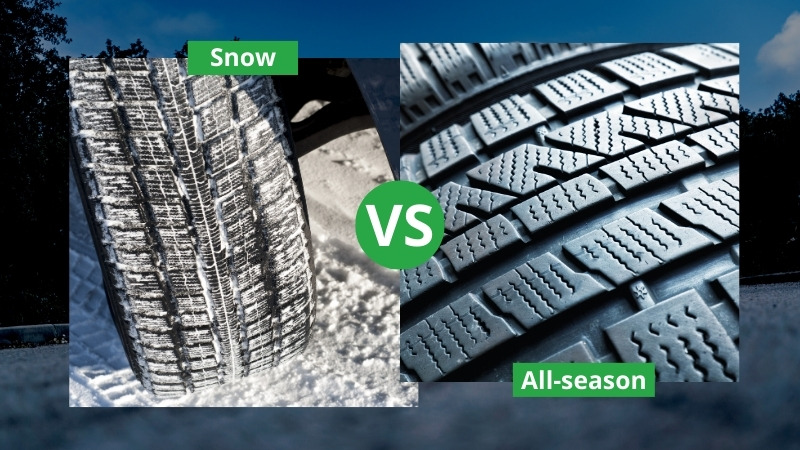When it comes to tire selection, understanding the difference between snow tires and all-season tires is essential for making a safe and informed decision.
From performance and handling to driving conditions and materials, both types of tires have their unique characteristics that cater to specific situations.
Snow tires, as the name suggests, are designed to handle snowy and icy conditions. They offer better traction, stability in turns, and improved stopping power when compared to all-season tires. On the other hand, all-season tires are built for versatility, offering longer tread life and lower rolling resistance in various weather conditions, including mild winter driving.
To determine which tire type is the best fit for your driving needs, consider factors such as your location, driving habits, and the severity of winter weather in your area.
By weighing the pros and cons of snow tires and all-season tires, you can make an educated decision that will keep you and your passengers safe on the road.
The Differences Between Snow and All-Season Tires
Tread Design
The tread design is one notable difference between snow and all-season tires. Snow tires have a deeper tread depth which reduces the amount of snow accumulation on the tire, allowing them to cut through snow and maintain grip better than all-season tires.
Additionally, snow tires typically have a more aggressive tread pattern with wider gaps between tread blocks, allowing them to better clear snow away from the tire and offer improved traction on icy surfaces.
Tire Compound
Tire compound is another critical distinction between snow and all-season tires. Snow tires are made with more flexible rubber compounds that maintain a better grip on the road, even in cold temperatures.
In contrast, all-season tires use a rubber compound designed for a wider temperature range, which may harden and lose grip in colder conditions.
Performance in Various Conditions
When comparing performance in different weather conditions, it is essential to consider your driving needs and environment. Snow tires out-perform all-season tires in snowy and icy conditions, providing better stopping and starting abilities.
Moreover, snow tires have consistently maintained stopping distances 30% to 50% shorter than all-season tires in cold-weather tests conducted by numerous safety agencies worldwide.
On the other hand, all-season tire technology offers year-round performance suitable for moderate climates where extreme cold or frequent snow and ice conditions are not encountered. While all-season tires may provide adequate performance in light snow, they are not designed for the harsh winter conditions that dedicated snow tires can handle.
Pros and Cons of Snow Tires

Advantages
When it comes to driving in snowy and icy conditions, snow tires offer a significant advantage over all-season tires. Their unique rubber compound maintains flexibility in extreme cold, providing better traction, improved stability in turns, and enhanced stopping power.
Additionally, snow tires typically have more biting edges compared to all-season tires, which means they can “bite” into snow and sleet more effectively, resulting in improved grip and overall performance during winter months.
Disadvantages
Despite their impressive benefits in cold weather, snow tires also have some downsides. One of these is their increased wear in warmer weather. Using snow tires throughout the year can lead to faster deterioration due to their softer rubber compound, which may result in increased expenses to replace them more frequently.
Another downside is that snow tires can affect your vehicle’s handling during warmer months. Their soft rubber compound can make your car’s handling feel sluggish, which can reduce your overall driving enjoyment and sense of control on the road.
It’s also worth noting that snow tires generally cost more than all-season tires, meaning you’d need to invest in separate sets of tires for different weather conditions if you choose to switch between snow and all-season tires.
Pros and Cons of All-Season Tires

Advantages
All-season tires are designed to offer a balanced performance in various driving conditions. They provide adequate traction for most drivers in dry and wet conditions, as well as light snow, making them a popular choice for everyday driving.
One of the main advantages of all-season tires is their versatility. You won’t need to change your tires with the seasons, which can save you time, effort, and money on tire storage and switching costs.
Plus, all-season tires tend to last longer than winter tires when used in moderate climates, as they have a harder rubber compound. This means you’ll likely replace them less frequently, saving you even more money in the long run.
All-season tires are also generally more fuel-efficient than winter tires, as they have lower rolling resistance, which can translate into reduced fuel consumption.
Disadvantages
While all-season tires are great for many drivers, they do have their limitations. In extreme winter conditions, or when temperatures drop significantly, all-season tires may not provide the best possible traction compared to dedicated winter tires.
Winter tires are specifically designed to perform better in snow and ice, offering improved stopping, turning, and acceleration capabilities.
All-season tires also may not be the best option for off-road driving, as their tread patterns and rubber compositions are not optimized for rugged terrain.
In summary, all-season tires can be a practical choice for those who experience mild to moderate winter conditions and want to avoid the hassle of changing their tires with each season.
However, if you live in an area with heavy snowfall or severe winter weather, or if you plan to drive off-road regularly, dedicated winter or all-terrain tires may be a safer and more suitable option.
Factors to Consider When Choosing Tires
When deciding between snow and all-season tires, several factors can help determine which option suits your needs best. Consider the following aspects when making your choice:
Climate
If you live in an area with long, cold winters and heavy snowfall, snow tires are highly recommended. The specialized tread design and rubber compounds in snow tires enhance grip and stay flexible in cold temperatures, providing better traction and stopping power.
For regions with mild winters and more warm or wet weather, all-season tires are typically a better option. These tires have treads designed to handle different road conditions, including wet roads and moderate snow. However, they may lose grip at temperatures below 40°F (7°C).
Driving Habits
Your driving habits play a crucial role in determining the best tires for your vehicle. If you frequently drive on snowy or icy roads or encounter harsh winter conditions, snow tires would be the safer choice. They can stop up to 40% sooner compared to all-season tires in cold weather.
On the other hand, if your driving mainly occurs in moderate weather conditions, all-season tires offer a good balance of performance and convenience without requiring regular seasonal tire changes.
Cost and Longevity
While snow tires provide excellent traction during the winter months, they are not engineered for longevity and wear more quickly than all-season tires. Snow tires typically cost more and need to be replaced more often. By using them only during cold weather, you can save money in the long run.
All-season tires, on the other hand, offer longer tread life and lower rolling resistance. They can be a cost-effective option if your driving habits and local climate allow for year-round usage.
Conclusion
In deciding between snow tires and all-season tires, it’s essential to consider the climate and driving conditions you typically face. Snow tires provide better stopping distances and improved handling in cold, snowy conditions, with performance in some cases being 30% to 50% better than all-season tires.
All-season tires offer versatile performance for dry, wet, and light snow conditions throughout the year. However, they might not be ideal in areas with frequent heavy snowfall or extreme temperatures.
On the other hand, all-weather tires can perform better in snow as compared to all-season tires, but still, they don’t quite match up with dedicated snow tires.
To make the most suitable choice for your needs, evaluate your location, the extent of winter weather you encounter, and how crucial driving performance is to you during those colder months.
Remember that regardless of the type of tire you choose, regular tire maintenance and responsible driving habits are crucial to ensuring optimal safety and performance on the road.
Hi, my name is Niklas, the head content creator & CEO of Whirling Wheelz. I am very interested in vehicles of all kinds, mainly cars. I have a car mechanics degree from high school and a big hobby of mine is to follow the WRC (World Rally Championship) both online and through travel.

